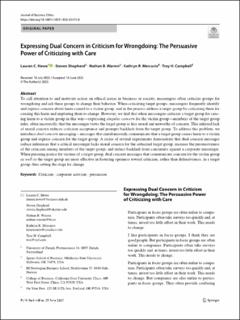| dc.description.abstract | To call attention to and motivate action on ethical issues in business or society, messengers often criticize groups for wrongdoing and ask these groups to change their behavior. When criticizing target groups, messengers frequently identify and express concern about harm caused to a victim group, and in the process address a target group by criticizing them for causing this harm and imploring them to change. However, we find that when messengers criticize a target group for causing harm to a victim group in this way—expressing singular concern for the victim group—members of the target group infer, often incorrectly, that the messenger views the target group as less moral and unworthy of concern. This inferred lack of moral concern reduces criticism acceptance and prompts backlash from the target group. To address this problem, we introduce dual concern messaging—messages that simultaneously communicate that a target group causes harm to a victim group and express concern for the target group. A series of several experiments demonstrate that dual concern messages reduce inferences that a critical messenger lacks moral concern for the criticized target group, increase the persuasiveness of the criticism among members of the target group, and reduce backlash from consumers against a corporate messenger. When pursuing justice for victims of a target group, dual concern messages that communicate concern for the victim group as well as the target group are more effective in fostering openness toward criticism, rather than defensiveness, in a target group, thus setting the stage for change. | en_US |

